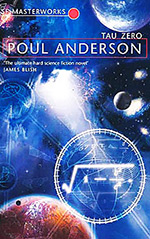
![]() JohnBem
JohnBem
2/28/2016
![]()
In Tau Zero, a novel about a group of astronauts and scientists undertaking a near-light-speed journey of interstellar exploration, Poul Anderson deftly evokes the wistfulness of leaving planet Earth, perhaps forever; the enormousness and vast lonely emptiness of outer space; and the great range of human reactions--hope and tenacity to despair and nihilism and the wide range between these extremes--to a deep awareness of humanity's banality, brevity, and ephemeral nature amid the immense, uncaring Universe. To produce these effects, Anderson employs descriptive and evocative, sometimes near-poetic, language, as well as paragraphs of hard science. To this layperson, the science is plausible and fascinating, and Anderson does a terrific job of describing the weird distortions of time and space that occur at near-light speeds. A strong theme that I took away from the novel is one of hope--that humanity will strive and endure and create meaning even in the face of cosmic indifference. Anderson does a beautiful job of showing that while outside the rocketship vast galaxies, enormous energies, and uncountable millennia roll by, on the other side of the hull the infinitesimal humans carry on with their lives--their science, their projects, their eating and drinking, their trysts and their parties, their religion or their lack thereof. At one point in the novel, a crewmember, overwhelmed by the enormity of their seemingly insurmountable cosmic peril, wonders in his way why they even bother to carry on at all. "But this is too much," he claims. "We're--well what are we? Animals. [... W]e can't go on... having regular bowel movements... while creation happens!" Ah, but I believe the message in Anderson's novel is that we do indeed need to go on as the mostly unfathomable Universe continues to unfold and evolve around us, that we must embrace our humanity while simultaneously endeavoring to transcend it. But Tau Zero is no message novel; it is not a sermon or philosophical treatise thinly disguised as a science-fiction novel. It is instead a well-written, engrossing and enthralling story of a rocketship-bound group of human beings battling the external forces of the cosmos and their own internal demons in their quest to emerge successful, fruitful, and viable into a sustainable and bright future, even when no future at all seems possible. Tau Zero is a hard-science-fiction novel of hope. And it is a very good one.